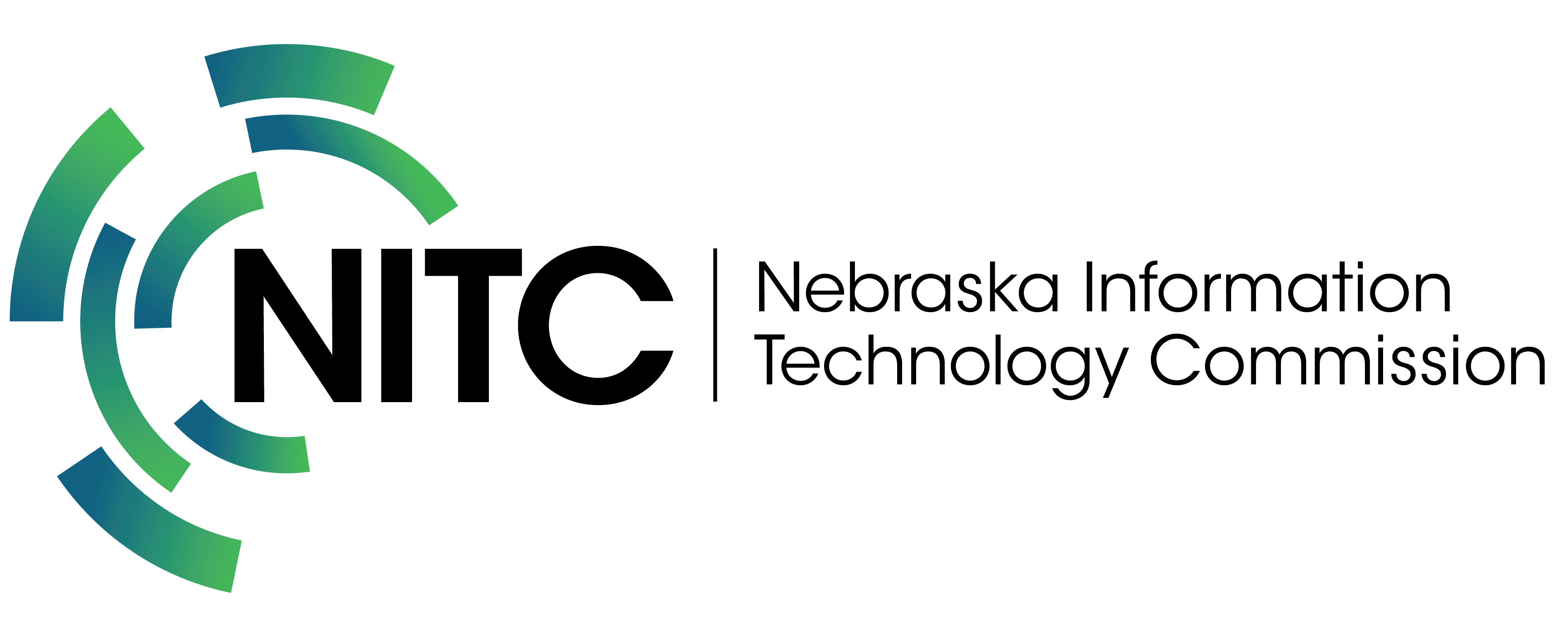Information Resources Cabinet
Minutes of the October 14, 1997 Meeting
Members Attending
Lt. Governor Kim Robak
Bob Luth, Dept. of Administrative Services
Al Abramson, Dept. of Motor Vehicles
Dorest Harvey, GDE Systems
Jim Van Horn, University of Nebraska
Col. Ron Tussing, Nebr. State Patrol
Berri Balka, Dept. of Revenue
Carrol Krause, State College System
Don Leuenberger, Health & Human Services
David Powers, Postsecondary Coordinating Commission
Tim Kelso, Dept. of Labor
Others Attending
Scott Moore, Secretary of State
Greg Lemon, Deputy Secretary of State
Rod Armstrong, State Information Technology Coordinator
Tim Erickson, DAS Intergovernmental Data Services
Yvonne Norton-Leung, Governor's Policy Research Office
Bob Beecham, Dept. of Education
Tom Controy, DAS Central Data Processing
Jim Ohmberger, DAS Central Data Processing
Steve Henderson, DAS Central Data Processing
Scott Danigole, Legislative Fiscal Office
Dave Wagaman, DAS Budget Division
Sandy Sostad, Legislative Fiscal Office
Kathy Tenopir, Legislative Fiscal Office
Steve Schafer, DAS Intergovernmental Data Services
Bill Miller, DAS Division of Communications
Bob Shanahan, Dept. of Labor
Gerry Oligmueller, DAS Budget Division
Education Steering Committee Model
David Powers presented a proposed model for a Planning & Policy Council on Educational Technology. He also described an alternate proposal presented by President Dennis Smith of the University of Nebraska that would include 8 college presidents (two each from the University system, state colleges, community colleges and independent colleges) and 8 representatives of K-12 education.
Jim Van Horn described President Smith's proposal as attempting to place those who are accountable for results on the planning council. David Powers commented that the Neb*Sat Planning Council, which would be modified by the Powers model, consists of people below the president's level, and also includes representation from the governing boards of the state colleges and community colleges, as well as the Postsecondary Coordinating Commission. He suggested that the Neb*Sat Planning Council might be kept in place, with the Policy & Planning Council a new entity.
Jim Van Horn said that the Neb*Sat Planning Council does not necessarily need to be at the presidential level. Carrol Krause pointed out that a linkage needs to exist between the Policy & Planning Council and the Nebraska Educational Telecommunications Commission.
Lt. Governor Robak commented that the differences among the two proposals are not that great. She said we may be trying to force new functions onto existing bodies in the interest of "no new bureaucracy." Carrol Krause said that the specific model proposed by President Smith may not have sufficient support to be effective. He also expressed concern about providing a support structure for NETC if the Neb*Sat Planning Council's work is redirected.
Lt. Governor Robak reinforced her view that non-educators should not prescribe the structure for the education steering committee. She asked education representatives on the IRC to continue working toward consensus, and indicated she will review the issue with Governor Nelson.
Report on Activities of the State Records Board
Secretary of State Scott Moore provided a briefing to the IRC on activities of the State Records Board (link). Dorest Harvey asked if the IRC and State Records Board might find themselves tripping over one another. Secretary Moore responded that he did not believe there was duplication of effort, and that the IRC was establishing policy while the State Records Board is concerned with the means to carry out policy.
Lt. Governor Robak asked if there has been any assessment of independent web sites operated by agencies outside the gateway provided by the Records Board. Bill Miller indicated that all web sites are linked to one another through the state home page operated by the Library Commission.
Jim Van Horn described a recommendation by the Gartner Group that major systems such as human resources and accounting apply web technology for broad access to information. Tom Conroy said that flexibility needs to be built into any new system to accommodate broad information needs.
Lt. Governor Robak asked if the Records Board had developed criteria for selecting a vendor to operate the gateway network. Secretary Moore responded that the Records Board chose not to develop numbered or weighted criteria. The Board will discuss what type of review should be conducted at its next meeting on October 24th.
Dorest Harvey asked if state agencies should be referred to the State Records Board regarding electronic access to their information. Secretary Moore responded that it depends in part on the structure of the new contract. The Records Board may be more in control over decisions currently made by the network manager.
Lt. Governor Robak asked that the Records Board work with the IRC to coordinate efforts. Secretary Moore agreed, stating that coordination is an admirable goal of the IRC.
Project Planning Model
Steve Schafer distributed a draft project planning model. Don Leuenberger reinforced the need for a model planning process that includes realistic expectations. He said that training and ongoing maintenance also need to be included.
Dorest Harvey asked if the full cost of ownership would be considered in the planning process, similar to capital construction. Steve Schafer responded that information technology is more complicated. Capital construction requires outside help, while some can undertake information technology projects with their own internal resources.
Carrol Krause said that more definition is needed about what projects would require this type of process. Don Leuenberger agreed, pointing out that consistency is desirable. Berri Balka said that more definition is also needed regarding what costs should be included and over what period of time.
Lt. Governor Robak asked Steve Schafer to report at the next meeting as to whether legislation is required; what elements such as training and maintenance need to be included, and what projects would be required to use the process.
Use of Cellular Phones in State Vehicles
A letter to the Governor from Senator LaVon Crosby was distributed. Sen. Crosby has asked the Governor to consider a policy regarding the use of cellular phones in state vehicles.
Jim Van Horn indicated that the University received a similar request, and that President Smith has sent a letter to chancellors regarding the use of cellular phones in University vehicles.
Bill Miller said that a policy on use of cellular phones in state vehicles would likely be unenforceable, and could open up a number of other issues such as eating while driving, etc. A statement about using cellular phones in a safe and prudent manner is probably the most appropriate response.
Lt. Governor Robak asked Col. Tussing about the perspective of law enforcement on the issue. Col. Tussing responded that it is not necessarily safer to pull off the road to dial a cellular phone, and that a ban on the use of cellular phones in state vehicles should not be instituted. He recommended that some guidelines be developed for the safe and prudent use of cellular phones in state vehicles.
Dorest Harvey suggested that Col. Tussing review President Smith's letter and come back with recommendations. Lt. Governor Robak suggested that Bill Miller be involved in the process. Bill suggested that Glen Eppens, Director of the DAS Transportation Services Bureau, also be involved.
Project Updates
**Lt. Governor Robak said that the technology coordination initiative, which the IRC has been discussing for several months, would be announced at a press conference in early November. A Powerpoint presentation has been developed and is being given to a number of organizations and individuals.
**Tom Conroy reported that the IRC's Electronic Mail Team is on scheduled to deliver a report to the IRC in November. Jon Ogden of the Dept. of Roads is providing leadership, and the team is gathering a wide range of input. A listserv is being established to promote discussion about the e-mail initiative.
**Tom Conroy discussed a model from North Carolina for standards and technical architecture. He said the model included a set of principles and a conceptual approach toward standards. He recommended that a subcommittee similar to that established for electronic mail be set up to review the North Carolina model; recommend those standards that exist or can be implemented immediately; and recommend a list of standards that should be developed in order of priority. Dorest Harvey, who also reviewed the North Carolina model, said that 80% can be modified and applied in Nebraska. He agreed with the subcommittee approach recommended by Tom Conroy. Lt. Governor Robak cautioned against setting the standards too tightly due to the fear of control. Tom Conroy said that ultimately the standards will become detailed, but that a broad base of involvement should prevent them from being perceived as controlling. Dorest Harvey said that the standards should simply be common sense. Tom Conroy indicated that the scope should be limited to state government. He said that an update was possible in November, with a more complete report in December.
**Steve Henderson reported that the grievance filed by PKS Information Services regarding the Century Date Change contract was denied by DAS Director Larry Primeau. Jim Van Horn asked how the CDC budget compared with available cigarette tax dollars. Steve Henderson responded that the contract amount is $16.7 million, with $11.4 million expected to come from cigarette tax resources. The balance would come from other fund sources. Bill Miller said that the $2.5 million per year of cigarette tax dollars is an estimate based on the number of tobacco users.
**Rod Armstrong reported that he had met with staff from the Nebraska Library Commission concerning measurement of progress in promoting electronic publishing by state agencies. Lt. Governor Robak asked for a quarterly progress report.
**Rod Armstrong reported that Tim Erickson is taking the lead in drafting legislation for the technology coordination initiative and CIO proposal. Al Abramson asked if this included agency proposals. Rod Armstrong replied that it does not. Lt. Governor Robak indicated that additional proposals may be included in the package at some point.
**Lt. Governor Robak described the Online Government lab in Washington D.C., operated by IBM. The lab shows how government agencies can be made more interactive, providing services such as interactive drivers license renewal. She said that initiatives such as allowing bids to be submitted electronically should be pursued. Dorest Harvey commented that the AIM Institute in Omaha has been named the midwest regional affiliate of Commercenet. Al Abramson asked if anyone was looking at smart cards. Lt. Governor Robak asked Rod Armstrong to conduct an inventory of interactive initiatives and report back at the next meeting.
Other Business
**Lt. Governor Robak asked if there is duplication of paper transactions between state government and the University. Jim Van Horn responded that there is a policy question about the current practice of DAS Accounting pre-auditing expenditures by the University. He indicated that the University's new financial management system will hopefully allow real-time access to the University's financial data. The University would prefer to see a change in policy regarding the pre-audit function. Bob Luth indicated that the issue is one of business processes, not technology. Lt. Governor Robak asked Bob and Jim to work toward resolution of the issue.
**Lt. Governor Robak announced the resignation of Larry Primeau as DAS Director effective October 31, 1997. Bob Luth has been named Acting DAS Director.
Next Meeting
The meeting adjourned at approximately 3:45 p.m. The next meeting is scheduled for Tuesday, November 18th at 1:30 p.m. in Room 1517 of the Capitol (please note the room change).
Meeting Minutes
